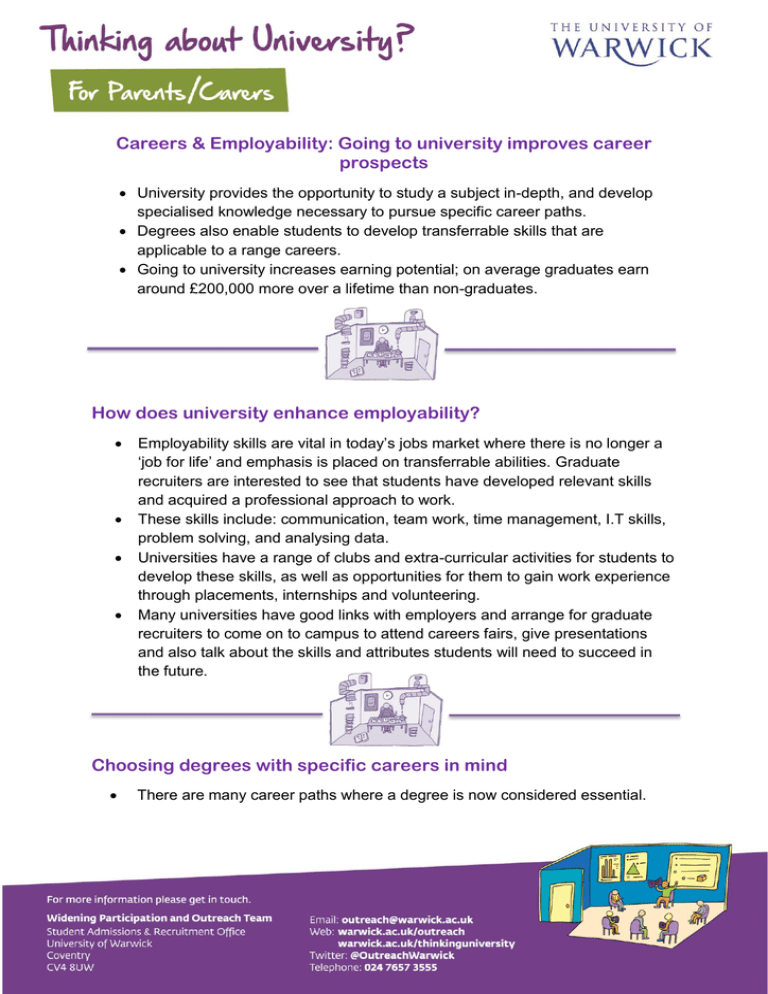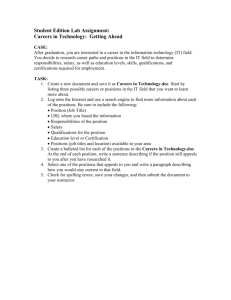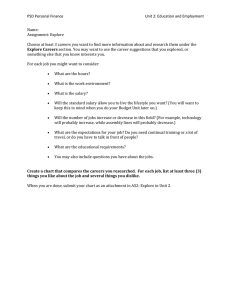Careers & Employability: Going to university improves career prospects
advertisement

Careers & Employability: Going to university improves career prospects University provides the opportunity to study a subject in-depth, and develop specialised knowledge necessary to pursue specific career paths. Degrees also enable students to develop transferrable skills that are applicable to a range careers. Going to university increases earning potential; on average graduates earn around £200,000 more over a lifetime than non-graduates. How does university enhance employability? Employability skills are vital in today’s jobs market where there is no longer a ‘job for life’ and emphasis is placed on transferrable abilities. Graduate recruiters are interested to see that students have developed relevant skills and acquired a professional approach to work. These skills include: communication, team work, time management, I.T skills, problem solving, and analysing data. Universities have a range of clubs and extra-curricular activities for students to develop these skills, as well as opportunities for them to gain work experience through placements, internships and volunteering. Many universities have good links with employers and arrange for graduate recruiters to come on to campus to attend careers fairs, give presentations and also talk about the skills and attributes students will need to succeed in the future. Choosing degrees with specific careers in mind There are many career paths where a degree is now considered essential. There are some professions that need specific qualifications accredited by a relevant professional body. It is important that you help your young person understand and research the requirements for the career area that they are interested in, to see whether a higher education qualification is expected. The Prospects graduate careers website www.prospects.ac.uk or the National Careers Service website www.nationalcareersservice.direct.gov.uk can help you do this. What if my young person doesn’t know what they want to do yet? If your young person doesn’t know what they want to do yet then going to university can be a good way of keeping their options open. Higher education gives them time and space to explore different careers, develop their skills and take part in activities that enhance their employability when they graduate. What this means is that students who study broad based academic subjects they enjoy, but may not have a defined career path , can do just as well as individuals who have chosen to study a more vocational degree. For those who later decide they want to do something that requires further study and specific qualifications, there are conversion courses or professional qualifications that can be studied at a higher level or in the workplace. How has the job market changed? The employment market changes all the time - jobs exist now that didn’t exist 10 years ago and as technology continues to change the way we work and interact, this pattern of growth and change looks set to continue. This makes it a very exciting time to be a student. Universities gather data each year about what their graduates go on to do 6 months after they leave university. This information is available to prospective students on the Unistats website www.unistats.direct.gov.uk and it is worth looking at this information with your young person when they are making applications to university, to help plan for the longer term. Work related vocational courses such as Law, Medicine and Social Work can lead students directly into a specific type of employment, but it is also important to be aware that some professions are far more competitive than others, with limited job vacancies or high entry requirements. It is sensible to encourage your child’s career aspirations but also help them to be realistic about what may be possible, and achievable. Useful websites www.prospects.ac.uk www.nationalcareersservice.direct.gov.uk www.unistats.direct.gov.uk www.ucas.com www2.warwick.ac.uk/services/scs www.ukces.org.uk/ourwork/working-futures




